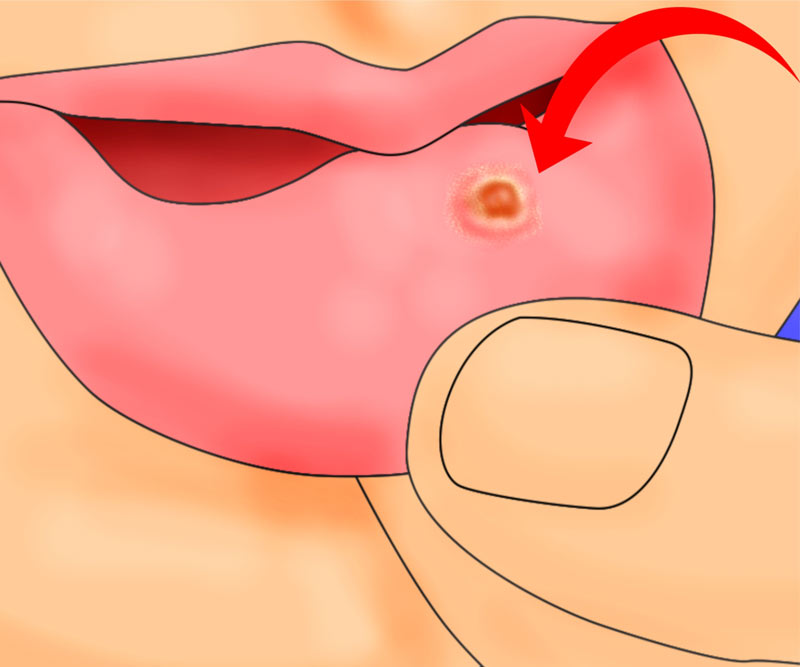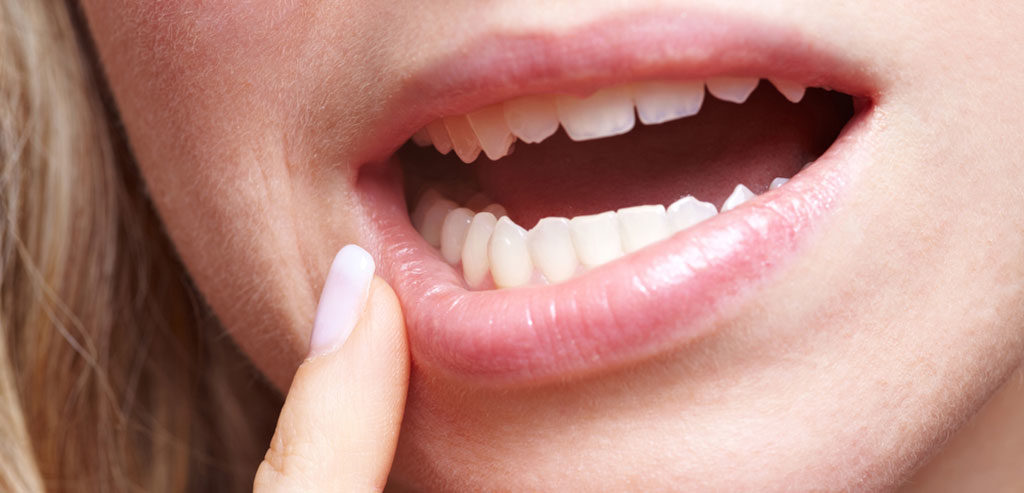Mouth ulcers are the quintessential example of how something so small in size can be so enormously uncomfortable. If you’ve ever experienced a mouth ulcer personally, you’ll know what we’re talking about. If not, well…consider yourself one of the lucky ones.
Seemingly out of nowhere, ulcers can appear at almost any time on the gums, the tongue, the inside of the cheeks of behind the lips. They begin with nothing more than a slight tingle, which over the course of time progresses to become a round or oval-shaped sore. More often than not no more than a few millimetres in diameter, it can nonetheless feel as if there’s a gaping hole in your mouth the size of Niagara Falls. Suffice to say, they can be extremely painful in their own right – make the mistake of putting them in contact with vinegar, lemon juice or strong alcohol for example and you’re in for an eye-watering experience!
On the plus side, mouth ulcers aren’t usually anything to worry about and tend to go away on their own after a week or two. During this time however, it can be difficult to chew, swallow, talk or drink. They aren’t contagious and don’t generally require treatment – they just tend to be a painful blight on your day you’ll want to be rid of ASAP.
What Can Cause Mouth Ulcers?
As already mentioned, mouth ulcers can technically come out of nowhere at any time with no specific cause behind them. However, there are certain triggers that can encourage the emergence of mouth ulcers. As such, if you find that you are particularly prone to mouth ulcers and suffer from them on a regular basis, it could be due to any of the following:
- Any kinds of injuries or abrasions to the inside of the mouth, which may be caused by biting your cheeks, wearing braces, excessively abrasive oral hygiene practices, damage caused by hard and sharp foods, dentures that don’t fit properly, drinks that are consumed while too hot or too cold and more.
- Hormonal imbalance in the body or changes in hormone levels.
- Certain vitamin and nutrient deficiencies can make the body more likely to develop mouth ulcers.
- Allergies to certain foods and reactions to medicines.
- Problems with the immune system and overall health in general.
- Poor oral hygiene.
As always, if you are in any way concerned about the frequency with which you are developing mouth ulcers, it’s a good idea to speak to your doctor or dentist as soon as possible. Chances are they’ll tell you it’s nothing to worry about, but it’s still a good idea for peace of mind.

Treating Mouth Ulcers
Sadly, there’s no silver-bullet cure that can get rid of mouth ulcers instantly. Even armed with the best mouthwash recommended by dentists and all the topical treatments in the world, they still hang around for a while.
Instead, treatments are usually created and provided as a means by which to reduce pain and stop them from getting any worse. Most can be picked up from any pharmacy without prescription, where further advice can be sought on the treatments available to you.
Just a few common examples of the treatments you’ll come across include:
- Gels. There are dozens of gels on the market right now, which when applied directly to mouth ulcers can do a great job immediately numbing the pain. They can also help reduce inflammation and prevent ulcers from spreading – most tend to taste pretty great too!
- Mouthwash. Ask the pharmacists about the very best mouthwash for mouth ulcers, which will probably be an anti-bacterial product to help prevent swelling and reduce inflammation. Be wary of anything overly harsh as it may simply be too painful to bear.
- Pastes. Certain pastes are also available, which along with relieving pain and helping reduce inflammation also form a protective layer over the ulcer. They work for the most part like gels, though with a little added protection.
Of course, if it turns out that one or more of the medications you’re currently taking is responsible for the problem, you’ll need to speak to your doctor about perhaps changing to a different medication. No such changes should ever be made or even tried out without professional advice, so don’t be tempted to experiment without first arranging a consultation.
Alternative Treatment Methods
Along with the conventional product-based approaches to treating mouth ulcers listed above, there are also various other ways and means by which it can be made easier to cope with them. Your own unique case will determine which do and do not work for you, but it’s nonetheless worth giving all of the following a try to maximise the likelihood of finding something effective:
- As with pain up and down the body, ice has the potential to be your best friend when it comes to mouth ulcers. A few times each day, take a small amount of ice in the mouth and position in where the ulcer is. It should numb the pain and help with inflammation, but be sure not to go over the top or you risk damaging your gums with excess cold.
- In conjunction with your daily oral hygiene regime, get into the habit of rinsing your mouth regularly with warm salt water. Or if you have been advised to use a medicated mouthwash by a doctor or pharmacist, use it as instructed several times each day.
- Be extremely careful when chewing your food, doing so slowly and keeping what you eat away from the ulcer to the most realistic possible extent.
- Try to stay away from sharp and hard foods like crisps for a while at least, as they can both intensify the pain and slow down the healing process of ulcers should they damage the area even further.
- Beware of anything too salty, sour, sweet or containing alcohol – it may prove rather too painful.
- If you wear braces or dentures, ensure they are properly fitted and speak to your dentist if adjustments are needed.
- Last but not least, step up your daily oral hygiene to a higher standard and do your best to keep your body in the peak of health at all times.
